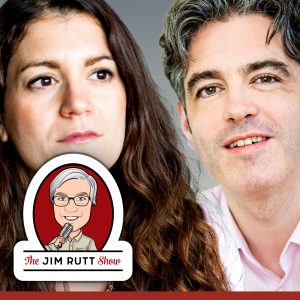
Currents 100: Sara Walker and Lee Cronin on Time as an Object
 2023-07-05
2023-07-05
Download
Right click and do "save link as"
Jim talks with Sara Walker and Lee Cronin about the ideas in their Aeon essay "Time Is an Object." They discuss the history of the idea of time, Newton's clockwork universe, the capacity for things to happen, the impossibility of time travel, Einstein's block universe theory, making time testable, conceptions of the arrow of time, irreversibility as an emergent property, the core of assembly theory, measures of complexity, recursive deconstruction, distinguishing random & complex, Kolmogorov complexity, the absence of a useful theory of complexity, counting steps in the assembly pathway, developing theories from measurement, the size of chemical possibility space, the role of memory in the creation of large organic chemicals, memory depth, the assembly index, the origins of life, a sharp phase transition between biotic & non-biotic molecules, life as a stack of objects, a phase transition between life & technology, techno-signatures, error correction in DNA, whether assembly theory is a theory of time, the temporal dimension as a physical feature of objects, implications for SETI & the Fermi paradox, spotting the difference between noise & assembly, the Great Perceptual Filter, looking for complexity in the universe, the probability of life originating, and much more.
Episode Transcript
"Time is an object," by Sara Walker and Lee Cronin (Aeon)
JRS EP5 - Lee Smolin on Quantum Foundations and Einstein’s Unfinished Revolution
Professor Sara Walker is an astrobiologist and theoretical physicist. Her work focuses on the origins and nature of life, and in particular whether or not there are universal ‘laws of life’ that would allow predicting when life emerges and can guide our search for other examples on other worlds. Her research integrates diverse perspectives ranging from chemistry, biology, geology, astronomy and the foundations of physics, to computer science, cheminformatics, artificial life, artificial intelligence and consciousness. At Arizona State University she is Deputy Director of the Beyond Center for Fundamental Concepts in Science, Associate Director of the ASU-Santa Fe Institute Center for Biosocial Complex Systems and Professor in the School of Earth and Space Exploration. She is also a member of the External Faculty at the Santa Fe Institute. She is active in public engagement in science, with appearances on "Through the Wormhole", NPR's Science Friday, and on a number of international science festivals and podcasts. She has published in leading research journals and is an internationally recognized thought leader in the study of the origins of life, alien life and the search for a deeper understanding of ourselves in our universe.
Leroy (Lee) Cronin is the Regius Professor of Chemistry in Glasgow. Since the age of 9 Lee has wanted to explore chemistry using electronics to control matter. His research spans many disciplines and has four main aims: the construction of an artificial life form; the digitization of chemistry; the use of artificial intelligence in chemistry including the construction of ‘wet’ chemical computers; the exploration of complexity and information in chemistry. His recent work on the digitization of chemistry has resulted in a new programming paradigm for matter and organic synthesis and discovery – chemputation – which uses the worlds first domain specific and universal programming language for chemistry – XDL, see XDL-standard.com. His team designs and builds all their own robots from the ground up and the team currently has 25 different robotic systems operating across four domains: Organic synthesis; Energy materials discovery; Nanomaterials discovery; Formulation discovery. All the systems use XDL and are easily programmable for both manufacture and discovery. His group is organised and assembled transparently around ideas, avoids hierarchy, and aims to mentor researchers using a problem-based approach. Nothing is impossible until it is tried.
view more
More Episodes
EP 189 Forrest Landry on Civilization Design
 2023-06-22
2023-06-22
 2023-06-22
2023-06-22
Currents 089: Erik Torenberg on Status Games
 2023-04-06
2023-04-06
 2023-04-06
2023-04-06
EP 183 Forrest Landry Part 2: AI Risk
 2023-04-04
2023-04-04
 2023-04-04
2023-04-04
02345678910111213141516171819
Create your
podcast in
minutes
- Full-featured podcast site
- Unlimited storage and bandwidth
- Comprehensive podcast stats
- Distribute to Apple Podcasts, Spotify, and more
- Make money with your podcast
It is Free
- Privacy Policy
- Cookie Policy
- Terms of Use
- Consent Preferences
- Copyright © 2015-2024 Podbean.com





